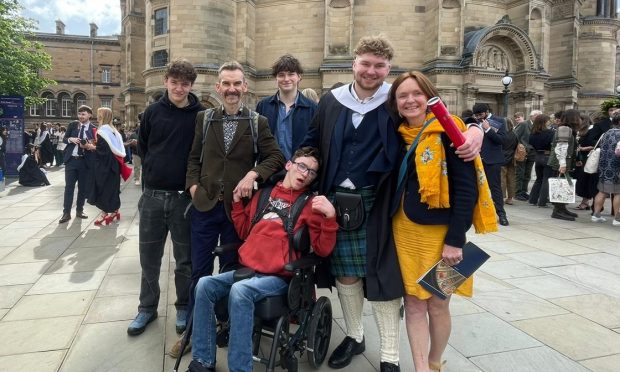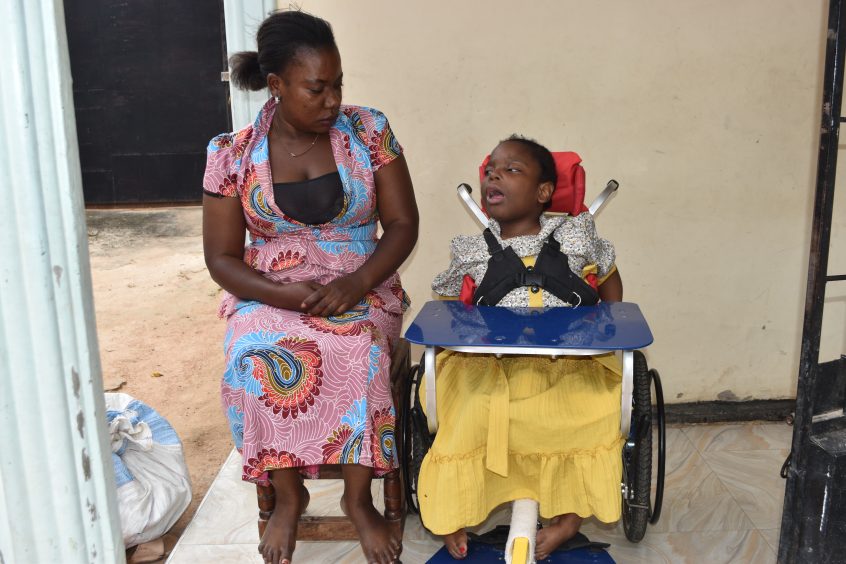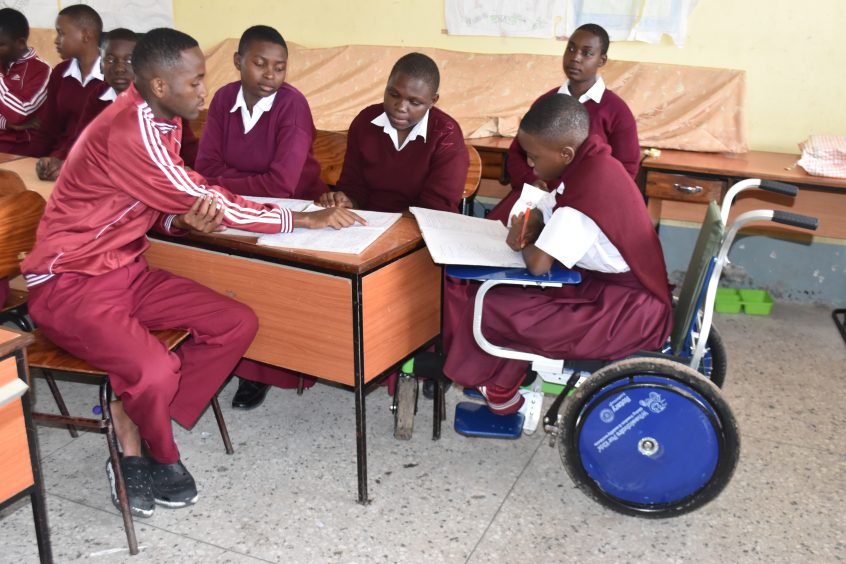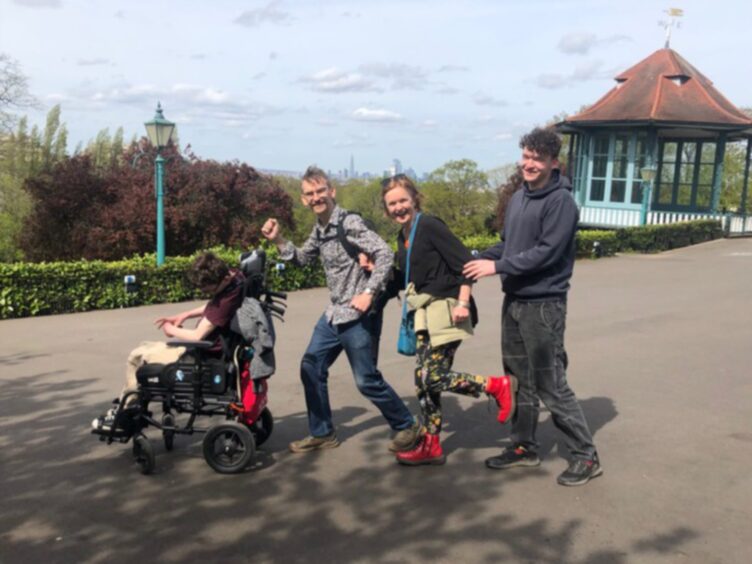
Just 24 hours after crossing the finish line at next month’s Great Scottish Run, Emma Burtles will be on a plane to visit those the money raised by her team benefits the most.
Alongside her family and friends, she’s raising money for Just Wheels, the charity she set up in 2017 to help reduce poverty and inequality for people with disabilities in Tanzania.
Providing high quality wheelchairs to those in the country’s Tabora region with mobility impairments, Emma was inspired by working in the African nation in the early 1990s.
And through supporting her 17-year-old son Alfie, who has cerebral palsy and himself uses a wheelchair, she realised the enormities of the challenges facing people living with disabilities, especially in places where there is little to no support.
“Having Alfie, I realised how absolutely vital a wheelchair is for being able to get around but also just to be able to access the stuff of life that’s taken for granted,” Emma said.
“Being able to get into school, a cafe or a shop, to see your granny or whatever it is, it’s almost impossible to imagine how important that is until you are in the position of being in a wheelchair or supporting somebody in a wheelchair.”
Work in Tanzania
The charity mainly works in the Tabora region of mid-western Tanzania. With a population of around 2.2 million, it’s a rural area where poverty is high and residents rely on agriculture for a livelihood.
Health care services are limited, particularly relating to disability care.
“In Tanzania, disability services are pretty minimal and variable depending on where you are,” Emma, 55, explained. “If you’re in Dar es Salaam, the services might be better, but in the Tabora region there’s absolutely no wheelchair service and very little other disability support.
“Unfortunately, disabled people are marginalised and in some cases actually targeted for being disabled. It’s a tough life and they’re often ignored or, just because of circumstances, families can’t necessarily provide much or any support.
“Often you hear stories of people just being left at home and surviving by only just getting enough food.
“Initially we started just literally providing wheelchairs, but I realised very quickly that education is also very important to get people off the bottom of the heap.”
Liaising with a friend she met while working there who is a wheelchair technician, the charity supports people in a number of ways, such as fundraising for ramps and accessible toilets in schools in the area.
“We’ve also got young people going to vocational training college, learning skills so that they can hopefully get some sort of work or set up a business,” Emma said. “This year we’ve supported 40 people to receive a wheelchair and support with their education.
“Primary education in Tanzania is free, but there are so many other things that could become a barrier, whether that’s uniform, getting there, access. When I was last there, a lot of the schools had the old fashioned desks we had here years ago where the seat is attached.
“We’re trying to change that landscape, helping in a variety of ways to enable young people to get into the school environment.
“We’re hoping through the half marathon to raise enough money for a few wheelchairs and to support a few young people on their journey.”
Providing wheelchair support
The provision of wheelchairs remains a core part of the charity’s work, particularly making sure that they are well-fitted and right for the person and where they live.
“You can buy wheelchairs in Tanzania second hand in the market, but they’re generally pretty poor quality and relatively very expensive,” Emma said.
“The main problem is they don’t fit, which then can create additional problems such as sores or issues with postural support.
“They’re also often highly inappropriate for the environment, where the roads are really not great. Wheelchairs made for European or American pavements fall apart very quickly or are just unusable all together.
“Those we provide are really robust and also comply with World Health Organisation standards so that means they’re fitted properly.”
Again, Emma’s experience with Alfie helped provide direction.
She added: “We’re constantly having to tweak and fix his wheelchair, which we are blessedly lucky to have courtesy of the NHS.
“They’re good quality, but they’re not fantastic and therefore they do fall apart. We’ve got a little kit with us all the time for fixing things and making do.
“Any wheelchair user you talk to will say how difficult it is if their wheelchair has an issue and they can’t get around or they get stuck somewhere.
“It’s really difficult and stressful. It’s an important part of what we do to ensure that the quality and type of wheelchair is appropriate.”
Emma can’t wait to fly out to Tanzania for the first time since before the pandemic, even if her legs are still tired out from the run.
“Working there was a very positive experience for me,” she said. “It is a magical country with I think a strong sense of itself.
“People there are very easy to get along with and talk to and Tanzania has got an interesting socialist past, and there’s a sense of equality.
“It’s very peaceful relative to other countries, albeit very poor and with issues that come with poverty and in health, opportunity and education.”
Taking on the run
Before that there’s the small matter of completing the Great Scottish Run through the streets of Glasgow on October 6.
Emma, husband Dave and her four sons are all taking part among a squad of 16 fundraisers for Just Wheels.
They’ll take turns pushing Alfie in his wheelchair along the half marathon route.
“Alfie is nonverbal and unable to do lots of things but he’s a larger than life character,” Emma said.
“He’s in a wheelchair full time and has just left school in June, so he’s getting into a new life of rhythm of life. Alfie and his twin turn 18 the week before the run.
“We live in Aberfeldy, which is a brilliant place to live and a very supportive community. Alfie is very much involved and part of it and everyone knows him.
“Being known and loved and valued for being you is really evident in a rural community.”
Training for the run has gone well so far, and the group are all buoying each other on ahead of the race day.
“It’s definitely a challenge for us all, but compared to the lives of people that we’re helping through the charity, it’s really easy,” Emma said.
“We’re getting to choose to do this, whereas all of them have to face multiple challenges every minute of every day of their lives.”
Visit justwheels.org.uk

Enjoy the convenience of having The Sunday Post delivered as a digital ePaper straight to your smartphone, tablet or computer.
Subscribe for only £5.49 a month and enjoy all the benefits of the printed paper as a digital replica.
Subscribe

 © SYSTEM
© SYSTEM